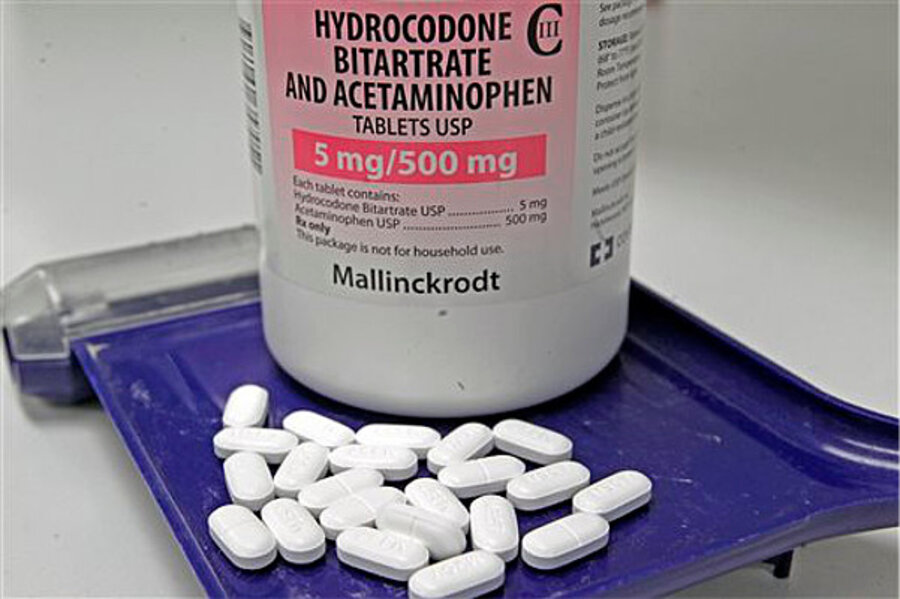Hydrocodone regulations: FDA wants limits on most prescribed painkillers
Loading...
| WASHINGTON
The Food and Drug Administration is recommending new restrictions on prescription medicines containing hydrocodone, the highly addictive painkiller that has grown into the most widely prescribed drug in the U.S.
In a major policy shift, the agency said in an online notice Thursday that hydrocodone-containing drugs should be subject to the same restrictions as other narcotic drugs like oxycodone and morphine.
The move comes more than a decade after the Drug Enforcement Administration first asked the FDA to reclassify hydrocodone so that it would be subject to the same restrictions as other addictive painkilling drugs. The FDA did not issue a formal announcement about its decision, which has long been sought by many patient advocates, doctors and state and federal lawmakers.
For decades, hydrocodone has been easier to prescribe, in part because it is only sold in combination pills and formulas with other non-addictive ingredients like aspirin and acetaminophen.
That ease of access has made it many health care professionals' top choice for treating chronic pain, everything from back pain to arthritis to toothaches.
In 2011, U.S. doctors wrote more than 131 million prescriptions for hydrocodone, making it the most prescribed drug in the country, according to government figures. The ingredient is found in blockbusters drugs like Vicodin as well as dozens of other generic formulations.
It also consistently ranks as the first or second most-abused medicine in the U.S. each year, according to the DEA, alongside oxycodone. Both belong to a family of drugs known as opioids, which also includes heroin, codeine and methadone.
Earlier this year the Centers for Disease Control and Prevention reported that prescription painkiller overdose deaths among women increased about fivefold between 1999 and 2010. Among men, such deaths rose about 3.5-fold. The rise in both death rates is closely tied to a boom in the overall use of prescribed painkillers.
The FDA has long supported the more lax prescribing classification for hydrocodone, which is also backed by professional societies like the American Medical Association.
But the agency's top drug regulator, Dr. Janet Woodcock, said in a statement Thursday: "The FDA has become increasingly concerned about the abuse and misuse of opioid products, which have sadly reached epidemic proportions in certain parts of the United States."
The FDA says it will formally request in early December that hydrocodone be rescheduled as a Schedule II drug, limiting which kinds of medical professionals can write a prescription and how many times it can be refilled.
The Controlled Substances Act, passed in 1970, put hydrocodone drugs in the Schedule III class, which is subject to fewer controls. Under that classification, a prescription for Vicodin can be refilled five times before the patient has to see a physician again. If the drug is reclassified to Schedule II, patients will only be able to receive one 90-day prescription, similar to drugs like OxyContin. The drug could also not be prescribed by nurses and physician assistants.
The FDA's request for reclassification must be approved by officials in other agencies within the Department of Health and Human Services.
News of the FDA decision was applauded by lawmakers from states that have been plagued by prescription drug abuse, many who have been prodding the agency to take action for months.
"Today was a tremendous step forward in fighting the prescription drug abuse epidemic that has ravaged West Virginia and our country," said Democratic Sen. Joe Manchin, in a statement. "Rescheduling hydrocodone from a Schedule III to a Schedule II drug will help prevent these highly addictive drugs from getting into the wrong hands and devastating families and communities
Sen. Charles Schumer of New York noted that the FDA's own expert panel recommended the reclassification more than nine months ago.
"Each day that passes means rising abuse, and even death, at the hands of hydrocodone-based drugs," Schumer said in a statement.
Still, Thursday's action immediately sparked criticism from some professional groups that said that the tighter restrictions could have unintended consequences, such as burdening health care workers and patients.
"The FDA's reported decision will likely pose significant hardships for many patients and delay relief for vulnerable patients with legitimate chronic pain, especially those in nursing home and long-term care," said Kevin Schweers, a spokesman for the National Community Pharmacists Association.







